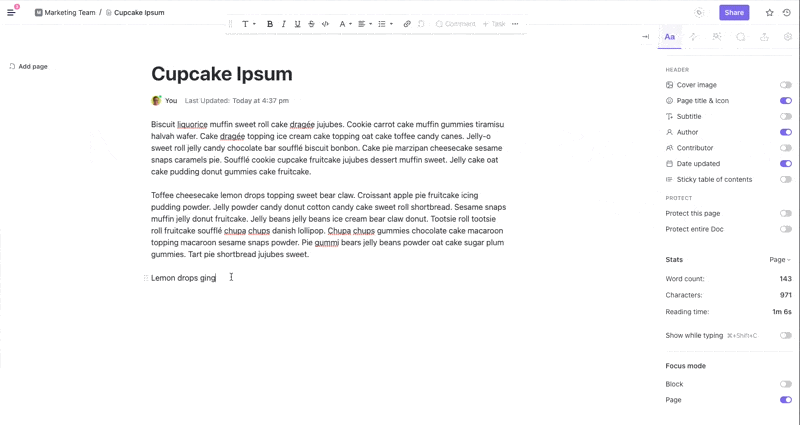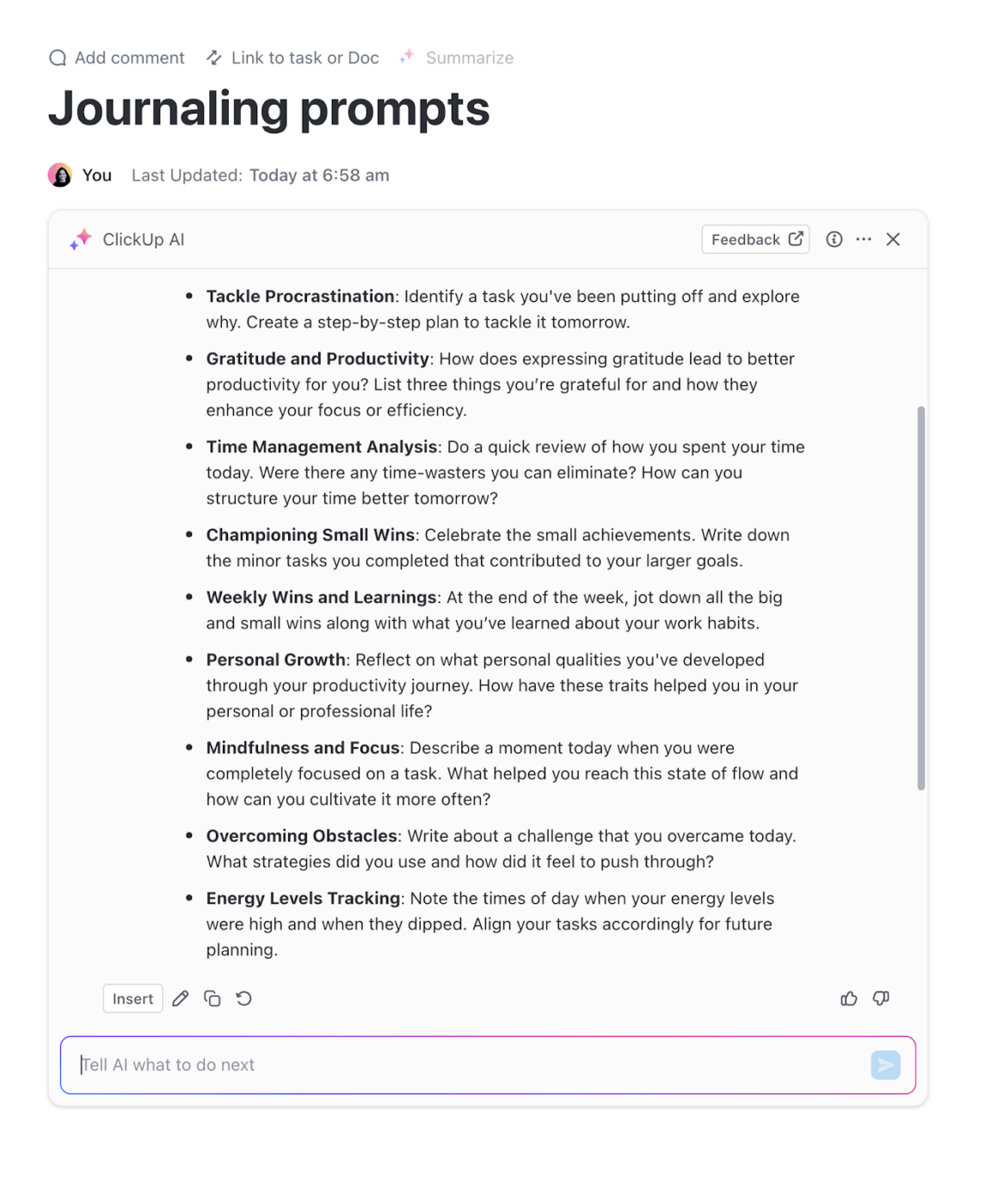

Do you know of anyone who describes their work as calm, spacious, or tranquil? Likely not.
Modern work is filled with overwhelm. Employees are suffocated every day with emails, Slack messages, meetings, tasks, tools, and more—aka productivity killers. Most of us begin our day with notifications, instantly going into a reactive mode. This continuous running on the hamster wheel makes us perpetually tired, distracted, and unable to be creative.
The simple practice of everyday productive journaling can prevent all this and more. Let’s see how.
Understanding Productivity Journaling
There are dozens of productivity tricks and hacks being promoted every day. Yet, one practice that has survived the test of time is journaling. Let’s understand it in detail.
What is productivity journaling?
Productivity journaling is the practice of writing down thoughts, feelings, and emotions in a self-reflective way.
There are various ways to do it. The most popular is the ‘Dear Diary’ method, where you write your thoughts and feelings as though you’re speaking to your journal. You might create a grocery list or write down what you dream of doing on your next vacation.
When stuck, people also journal their responses to prompts such as, ‘What are you grateful for today?’ Or ‘What is the one thing that you’d change about your actions today?’
While some methods might be more suitable for certain goals, all journaling has shown positive benefits.
Why practice journaling?
Researchers from Penn State found that web-based positive affect journaling (PAJ) helped reduce mental distrust and increase well-being. To interpret it simplistically, writing down one’s feelings in response to pre-defined prompts made people feel better.
It doesn’t end there. Productive journaling offers several mental and physical health benefits.
Clearing mental clutter: Reflective writing enables you to process complex emotions without judgment. It helps you feel your feelings and resolve unresolved emotions, promoting better memory.
Supporting anxiety: Anxiety is defined as the excessive and persistent worry about everyday situations. Journaling is an effective way to gently address fears and prevent them from accumulating over time.
Stress relief: Have you ever felt like screaming into the void? Journaling offers a close alternative. It allows you to express your thoughts—however inappropriate/unprofessional they may seem—in a productive way to find resolution.
Anchoring: Whether it’s work or personal life, journaling allows you to anchor yourself to your goals. It helps organize tasks, chores, and events based on your priorities.
Self-reflection: Journaling, when combined with habit-tracking, can help identify patterns. For instance, are you having bad mood days when you haven’t had enough sleep? Do you feel lethargic after travel? This, in turn, builds emotional intelligence and critical thinking.
Creative insights: Use the journal to explore problems, consider a wide range of solutions, and then note down creative insights you might come up with.
Planning: While productive journaling isn’t a planning tool, it helps set the stage. It offers a much-needed break from the rush of business-as-usual to pause, listen, understand, and plan your future.
Why use productivity journaling in the workplace?
“83% of US workers suffer from work-related stress,” finds a study. On the other hand, employers can see 4X productivity gains for every $1 spent on ordinary mental health concerns.
In addition to the financial gains, here are some qualitative benefits of writing things down.
Better task-juggling: Most workers today need to complete multiple tasks a day. Journaling clears the table to do what’s important.
Self-development: Journaling creates self-awareness and emotional regulation. As a result, employees are clearer about their professional development journey.
Focus: Journaling eliminates distractions and enables you to stay focused on the goal. Moreover, it helps people introspect and realign themselves to the destination.
Collaboration: Clarity of thought leads to quality of action. Journaling enables people to sharpen their ideas and present them more cohesively.
Resilience: Fast-moving marketplaces today need people to be resilient—financially, emotionally, and professionally. Journaling helps understand one’s vulnerabilities and work towards overcoming them.
So, how does one practice professional journaling? Let’s see.
Core Components of a Productivity Journal
A productivity journal can be anything you need it to be. A list of things, a report about your day, a response to a prompt, just about anything. However, it helps to have the following core components of a productivity journal to be effective.
Goal-tracking
The first step to achieving a goal is to write it down and make it visible. The goal-tracking element of the productivity journal helps you:
- Define your top priority
- Break down your goal into smaller, actionable steps
- Identify means of achieving the goal
- Set deadlines or milestones
- Track progress
Let’s say your goal is to read 52 books a year. To achieve this, you need to read one book a week. Assuming that the average book is 350 pages long, you’ll have to read 50 pages a day.
Setting a tracker in your productivity journal for this goal helps create a habit of reading.
Monitoring absenteeism
Productive journaling isn’t just about what you did. It is also about what you didn’t. Let’s say you have set a goal of working 8-hour days.
You can monitor the number of hours worked by using a daily calendar tracker in your productivity journal. You can sense patterns based on other aspects of your day if you’re not achieving your goals.
Emotional reflection
A productivity journal helps individuals reflect on their thoughts, feelings, and actions. Let’s say you lost your temper at a business meeting today. Or gave unkind feedback to a team member.
Reflecting on your actions helps trace what caused them. You might find out that you felt attacked by your superiors, so you lost your temper. Journaling helps perform root-cause analysis on the complex workings of your mind. It also helps build work-life balance, drawing boundaries between work and home.
Knowledge management
Life-long learners add journaling to their productivity templates to note their daily lessons consistently. For instance, as a writer, you can record vocabulary that interests you. A designer can make lists of curious tools and automations they can use.
Journaling can turn into your personalized knowledge base.
Types of Productivity Journals
Everyone’s journal is unique. You are free to use your journal in any way you deem fit. Here are some of the ways people commonly use their productivity journal.
Gratitude journal
Record things you’re grateful for each day. Gratitude journaling helps in:
- Fostering a positive mindset
- Focus on what you have and not what you don’t
- Appreciation of life/work as it is
- Building on positive actions
Goals journal
Set, track, and reflect on personal and business goals. Use it to:
- Set clear goals
- See your goals regularly
- Monitor your progress
- Reflect on what went well and what didn’t
- Explore ways to improve goal achievement
Values journal
Define and reflect on the values that shape your actions/behaviors. For example, if your core value is quality over quantity, you will focus on building frameworks, checklists, and standards to achieve that instead of setting numeric goals.
You will build open communication channels and comprehensive record-keeping if you value transparency.
Use the values journal to identify your values and refer to them when facing a challenge. As you go along, write down how you used these values to make decisions. It will help you stay in alignment across various scenarios.
Curiosity journal
Also known as commonplace journaling, a curiosity journal is a record of concepts, ideas, and discoveries that interest you. For example, if you see a YouTube video and like the idea, you can write about it in your curiosity journal.
This helps you embrace curiosity, stimulate intellectual growth, and uncover new insights for development in various areas of life.
Time management journal
Track time spent on various projects and activities. For instance, a daily planner offers an hourly breakdown of events. Productivity journaling is a great time management technique. Record what you do each hour of the day to spot patterns and improve your time management skills.
If you’re unsure of how to track time, try ClickUp’s work log templates.
Morning pages
Dump your early morning thoughts to clear your mind. This can help you release the previous day’s baggage and set you up for a productive day.
You can choose any of the above for your journaling practice or try a combination. Either way, here are some strategies that will help.
Effective Strategies for Productivity Journaling
If you’re a beginner, any journaling is good practice. Just open a notebook or spin up a digital journal and begin. Then, slowly incorporate the following strategies for productivity journaling to improve outcomes with life planning software like ClickUp.
Focus on your goals
Align your productivity journaling with your goals to make it purposeful. For instance, if you seek to eliminate emotional stress, simply writing down your values and introspecting on your actions might be helpful.
A time tracker would be great if you’re struggling with time management. If you’re a creative person—a writer, designer, digital content creator, etc.—a curiosity journal is perfect.
Set up your productivity journal based on your goals. Use ClickUp Docs to jot down your goals and convert them into your to-do list as needed.

Personalize your entries
Let go of the fear of the blank page. Try some free writing, jotting down what comes to mind without regard for grammar, spelling, or even sentence structure. For instance, you could just describe the positive events of the day.
Do not edit at this stage (actually, you don’t need to edit your journals ever!). Make it entirely your own—warts and all. Try ClickUp Docs to write your journal entries undistracted. Use the mark-down view and focus more on canceling out noise.
Add journaling to your note-taking strategies so that you can reflect on feedback/criticism you received that day.

Make it fun
Not a words person? No sweat. Enhance your journaling experience by incorporating elements like doodles, media, and lists, giving it character. Create collages and mood boards.
Avoid perfectionism
A journal isn’t meant to be read by anyone. No one is evaluating or judging it. It is your personal space for you to explore your mind. So, avoid perfection. Let the spelling mistakes and broken sentences be. If the cat you drew looks like a cow, leave it in. Embrace the imperfections.
Embrace slowness
As the world spins past rapidly around you, embrace slowness in your journaling practice. Shut down all other tabs/apps and write with a clear mind. Take the time to think and process. React less and evaluate more.
Be consistent
When you consistently practice productive journaling, you will see its compounding effects. Consistency builds and sustains momentum for progress.
We’ve got something for you if you still can’t think of anything to write. Try the daily log templates on ClickUp to give you a structure to work on.
Even better, use ClickUp Brain, an AI tool, to generate ideas and give you journaling prompts to get started.

Trust the process
It is unlikely that you’ll save 4 hours a day after journaling for 15 minutes. Don’t rush to outcomes. Trust the process.
Write everyday consistently even if you don’t see immediate results. If, in the beginning, you struggle to write, don’t give up. If your own journal writing reads like gibberish, forgive yourself.
Challenges of Productivity Journaling
The simplicity and compounding benefits of productivity journaling make it impossible to ignore. Simple as it might be, journaling is not easy. Individuals face several challenges in incorporating a journaling practice.
Here are some challenges and how you can overcome them.
Lack of consistency: Finding the time or motivation to journal consistently amidst busy schedules is a struggle. But the rewards are worth it. To be consistent, try:
- Setting a daily reminder for journaling
- Using prompts while feeling a lack of inspiration
- Writing just a few words to get started
Overwhelm: Most people seek journaling to combat overwhelm. Yet, the practice of journaling itself can be overwhelming. Perfectionism can lead to paralysis.
To avoid this, let your thoughts flow and write freely without worrying about structure or perfection.
Self-doubt: Looking at the fantastic Instagram pictures of others’ journals can intimidate you and discourage continued practice.
Remind yourself that journaling is personal and not a competition—approach with self-compassion to express yourself authentically. You can not fail in an endeavor in which merely doing it is successful.
Tool sprawl: Before starting to journal, if you find yourself buying several notebooks or pens or downloading a number of digital journal apps, you’re not alone. Most aspiring journalers experience this struggle.
Don’t let the tool trouble you. Begin writing with whatever is at hand—a slip of paper or the notepad on your phone. Focus on the practice and keep at it.
Let Your Ideas Flourish With ClickUp for Productivity Journaling
The average worker in the US spends two days a week on emails and meetings. This is a lot of information flying your way from disparate sources, leaving you to consolidate and process it all.
Productive journaling is a great way to do this. It enables you to clear mental clutter, handle overwhelm, and focus on what matters. It allows you to go through your feelings without judgment and resolve conflicts in your mind.
ClickUp’s Notepad and Docs are fantastic writing tools that lend themselves perfectly to journaling. See for yourself. Try ClickUp for free today.
FAQs About Productivity Journaling
1. What is productivity journaling?
Productivity journaling blends journaling and productivity to boost self-awareness, goal clarity, time management techniques, accountability, and creativity.
2. How do you start a productivity journal?
The first move is to write your first entry. Be consistent with realistic expectations and take your time.
3. What are the three types of journaling?
There are many types of journaling, but a few to explore for a start include the gratitude journal, goals journal, values journal, and curiosity journal.


Questions? Comments? Visit our Help Center for support.